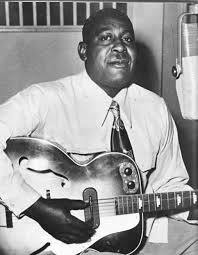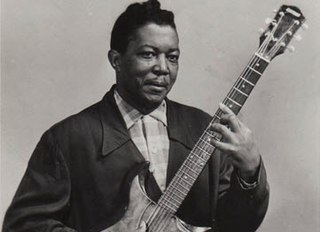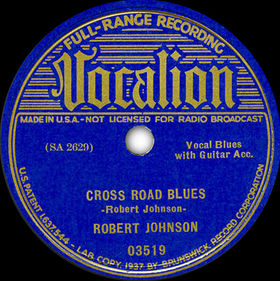
Robert Leroy Johnson was an American blues musician and songwriter. His landmark recordings in 1936 and 1937 display a combination of singing, guitar skills, and songwriting talent that has influenced later generations of musicians. Although his recording career spanned only seven months, he is recognized as a master of the blues, particularly the Delta blues style, and one of the most influential musicians of the 20th century. The Rock and Roll Hall of Fame describes him as maybe "the first ever rock star".

Delta blues is one of the earliest-known styles of blues. It originated in the Mississippi Delta and is regarded as a regional variant of country blues. Guitar and harmonica are its dominant instruments; slide guitar is a hallmark of the style. Vocal styles in Delta blues range from introspective and soulful to passionate and fiery.
Tommy McClennan was an American Delta blues singer and guitarist.

Joseph Lee "Big Joe" Williams was an American Delta blues guitarist, singer and songwriter, notable for the distinctive sound of his nine-string guitar. Performing over five decades, he recorded the songs "Baby, Please Don't Go", "Crawlin' King Snake" and "Peach Orchard Mama", among many others, for various record labels, including Bluebird, Delmark, Okeh, Prestige and Vocalion. He was inducted into the Blues Hall of Fame on October 4, 1992.

John Lee Curtis "Sonny Boy" Williamson was an American blues harmonica player, singer and songwriter. He is often regarded as the pioneer of the blues harp as a solo instrument. He played on hundreds of recordings by many pre–World War II blues artists. Under his own name, he was one of the most recorded blues musicians of the 1930s and 1940s and is closely associated with Chicago producer Lester Melrose and Bluebird Records. His popular songs, original or adapted, include "Good Morning, School Girl", "Sugar Mama", "Early in the Morning", and "Stop Breaking Down".

Willie Lee Brown was an American blues guitar player and vocalist. He performed and recorded with other blues musicians, including Son House and Charlie Patton, and influenced Robert Johnson and Muddy Waters. Brown is considered one of the pioneering musicians of the Delta blues genre.

Arthur William "Big Boy" Crudup was an American Delta blues singer, songwriter and guitarist. He is best known, outside blues circles, for his songs "That's All Right" (1946), "My Baby Left Me" and "So Glad You're Mine", later recorded by Elvis Presley and other artists.

Tommy Johnson was an American Delta blues musician who recorded in the late 1920s and was known for his eerie falsetto voice and intricate guitar playing. He was unrelated to the blues musician Robert Johnson.

Robert Lee McCollum was an American blues musician who played and recorded under the pseudonyms Robert Lee McCoy and Robert Nighthawk. He was the father of the blues musician Sam Carr. Nighthawk was inducted into the Blues Hall of Fame in 1983.
"Corrine, Corrina" is a 12-bar country blues song in the AAB form. "Corrine, Corrina" was first recorded by Bo Carter. However, it was not copyrighted until 1932 by Armenter "Bo Carter" Chatmon and his publishers, Mitchell Parish and J. Mayo Williams. The song is familiar for its opening verse:

"Cross Road Blues" is a song written by the American blues artist Robert Johnson. He performed it as a solo piece with his vocal and acoustic slide guitar in the Delta blues-style. The song has become part of the Robert Johnson mythology as referring to the place where he supposedly sold his soul to the Devil in exchange for his musical talent. This is based largely on folklore of the American South that identifies a crossroads as the site where such pacts are made, although the lyrics do not contain any references to Satan or a Faustian bargain.
H. C. Speir was an American "talent broker" and record store owner from Jackson, Mississippi. He was responsible for launching the recording careers of most of the greatest Mississippi blues musicians in the 1920s and 1930s. It has been said that, "Speir was the godfather of Delta Blues" and was "a musical visionary". Without Speir, Mississippi's greatest natural resource might have gone untapped."

"Sweet Home Chicago" is a blues standard first recorded by Robert Johnson in 1936. Although he is often credited as the songwriter, several songs have been identified as precedents. The song has become a popular anthem for the city of Chicago despite ambiguity in Johnson's original lyrics. Numerous artists have interpreted the song in a variety of styles.

Screamin' and Hollerin' the Blues: The Worlds of Charley Patton is a boxed set collecting remastered versions of the recorded works of blues singer Charley Patton, with recordings by many of his associates, supplementary interviews and historical data. The set won three Grammy awards, for Best Historical Album, Best Boxed or Special Limited Edition Package, and Best Album Notes.
The Blues is a 2003 documentary film series produced by Martin Scorsese, dedicated to the history of blues music. In each of the seven episodes, a different director explores a stage in the development of the blues. The series originally aired on PBS in the United States.
Document Records is an independent record label, founded in Austria and now based in Scotland, that specializes in reissuing vintage blues and jazz. The company has been recognised by The Blues Foundation, being honoured with a Keeping the Blues Alive Award. Document Records is the only UK-based recipient of the award in 2018.

Houston Stackhouse was an American Delta blues guitarist and singer. He is best known for his association with Robert Nighthawk. He was not especially noted as a guitarist or singer, but Nighthawk showed gratitude to Stackhouse, his guitar teacher, by backing him on a number of recordings in the late 1960s. Apart from a brief tour in Europe, Stackhouse confined his performing to the area around the Mississippi Delta.
"Early in the Morning" is a blues song that was recorded by Sonny Boy Williamson I in 1937. Identified as one of his most successful and influential tunes, it was inspired by earlier blues songs. "Early in the Morning" has been recorded by various musicians, including Junior Wells, who made it part of his repertoire.
Freddie Spruell was an American Delta blues guitarist and singer, variously billed as Papa Freddie or Mr. Freddie. He is generally regarded as the first Delta bluesman to be recorded, although Mamie Smith (1920), Ed Andrews (1923) and Blind Lemon Jefferson (1925) predated him in recording the first blues records. Details of his life are sketchy and sometimes contradictory.












